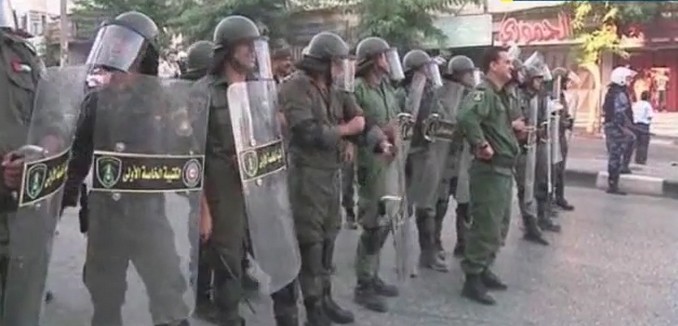A huge majority (70%) of Palestinians say they are afraid to criticize their president, Mahmoud Abbas, according to a poll (Arabic link) published last week by the Palestinian Center for Policy and Survey Research.
Only 30 percent said that they are not afraid to criticize the Palestinian Authority in the West Bank, while 34% of Palestinians in Gaza Strip said they are afraid to criticize their government. Moreover, only 21% say there is press freedom in the West Bank and 20% say the same about the status of the press in the Gaza Strip.
One recent controversy centered on the largest Palestinian union, which represents about 40,000 employees of the Palestinian Authority. Last month, Abbas outlawed the union and had two top officials jailed for a week. The decision followed strikes by the union demanding more benefits, the Associated Press (AP) reported.
Critics said Abbas and Fatah had used the union in the past as a tool against rivals. They said Abbas went after the union last month because it was causing problems for his hand-picked prime minister, Rami Hamdallah.
Senior Fatah official Azzam al-Ahmad, who criticized the decision to ban the union, in turn found himself accused by Hamdallah of nepotism for promoting his sister-in-law for the post of education minister — a rare “outing” of one member of the ruling elite by another.
Moreover, Palestinian security agents routinely monitor social media and send threats or complaints to some of those criticizing Abbas. Critics say that after a decade in power, Abbas is overseeing a largely authoritarian system with shrinking room for dissent.
Ahmed Zaki, the news director of Palestine TV, said he was recently demoted after a Facebook post in which he criticized the choice of a talk show guest on his station — an Egyptian commentator who supported Israeli attacks against Hamas targets in Gaza. After that post, Zaki said he received a call from Abbas’ office and was told he would no longer serve in his job, though he remains on the station’s payroll.
Tami Rafidi, a 35-year-old Fatah activist in Ramallah, told AP she has been admonished for Facebook posts critical of Abbas and was told by party members and security officials to tone down her comments. She said she was not threatened because of her role in Fatah:
“But I am aware of others who were pressured or threatened to stop criticism. The margin of freedom in the social media is narrow in the Palestinian territories.”
Complaints of heavy-handedness come at a time of uncertainty on all fronts. Abbas’ has chosen to to seek statehood unilaterally through international organizations bypassing negotiations, while the bitter rivalry between Fatah and the Hamas terror organization continues to fester.
With his approval rating down to 35 percent, Abbas is lashing out against those he views as a political threat, such as former security chief, Mohammed Dahlan, now based in the United Arab Emirates, and former Prime Minister Salam Fayyad.
Jihad Harb, a writer and Fatah member told AP, “We face an autocratic regime that doesn’t believe in any freedoms, in freedom of unions or freedom of speech. The people are now terrified. They don’t speak up, fearing reprisal.”
Ahmad Assaf, a Fatah spokesman, said criticism is permitted — provided it does not cross a line by accusing Abbas or members of his government of being traitors or infidels. “If you look around and see what is going on in the Arab world, you realize how much freedom we enjoy here,” Assaf said.
According to last week’s poll, more than 80 percent of Palestinians believe that Palestinian Authority institutions are tainted by corruption, with nepotism cited as a major problem.
Palestinian media, both in the West Bank and Gaza Strip, is highly partisan and not critical of the regime. Journalists working for the news systems prefer not to risk criticizing the regime, a move which can lead to their arrest.
[Photo: JewishNewsOne / YouTube ]




